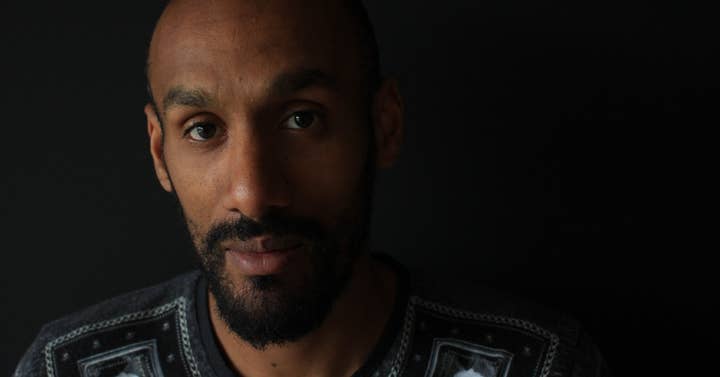Deathloop's Dinga Bakaba on rising to director and avoiding crunch
The studio director of Arkane Lyon on immersive sims and playing to your studio's strengths
Dinga Bakaba's road into the industry was, in his own words, "very chaotic."
Despite his love of video games, as well as board games and tabletop RPGs, a job as a developer seemed inaccessible due to his lack of skills in mathematics and art. He gave up hope of entering the games industry, until he heard a term that was new to him: game design.
"In most French articles in magazines, people would only talk about the developers and the programmers, but the term 'game design' was not frequent at all," he explains.
"When I came across this term, I Wikipedia'd it immediately and that clicked. The role of establishing the rules and tweaking them and basically making the game part of a game appealed to me immediately."
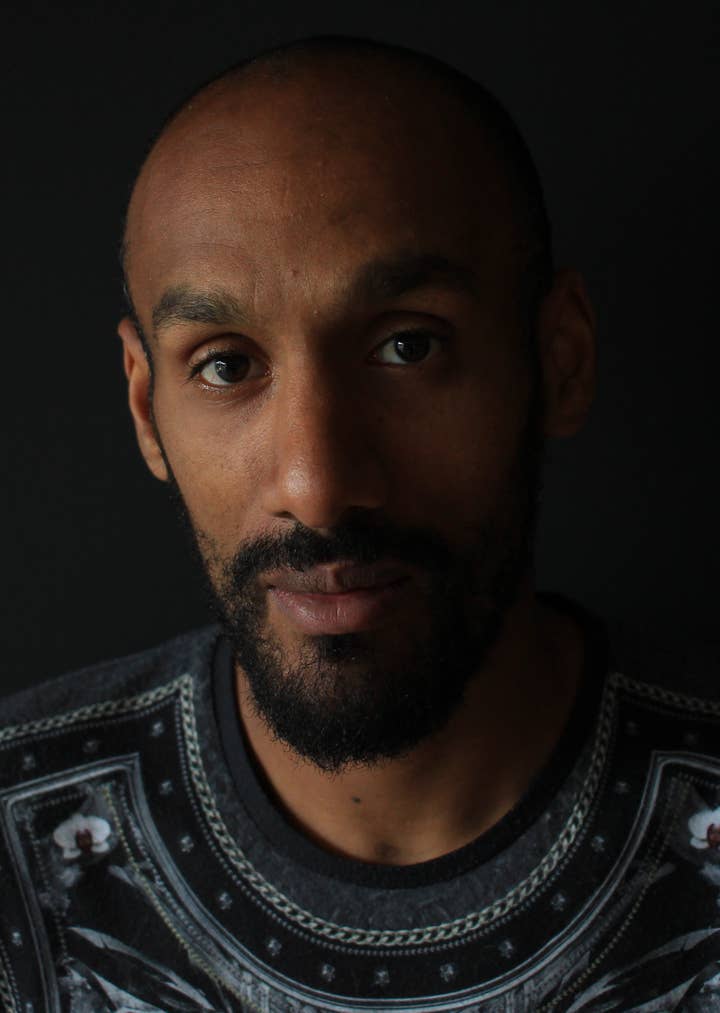
All the time he had spent modding board games, experimenting with level editors on titles like Tony Hawk, and serving as dungeon master when playing RPGs gave him a foundation to build on. His ability to read English opened up new avenues to learn about the discipline of game design.
"There were no French books on it," he says, "so I was lucky to access English and read a lot of blogs and websites, especially sites about the industry, learning for myself what I could not learn at school."
In fact, he dropped out of school as he sought a way into the industry -- a path that would eventually lead him to become studio director of Arkane and into an award-winning career, including the Develop Star Award at this year's Develop:Brighton.
Becoming a father at 22 increased the pressure for a steady income, and he eventually got a QA role at a mobile games studio in the feature-phone era. He later secured an internship in game design, and then his first game design role at Paris-based studio Wizarbox, but his dream was to work in AAA. He joined Dutch games firm Playlogic, where he got to grips with tools like Unreal Engine 3, but continued to dream bigger.
His boss, Olivier Lhermite, recommended him to Arkane founder Raphaël Colantonio and helped secure an interview with not only Colantonio, but long-serving Arkane staffer Julien Roby and Dishonored creative director Harvey Smith. The interview, Bakaba says, was "super scary but went well" and he joined the team just as Dishonored was entering full production. It was a dream come true.
"I always loved immersive sims since Ultima Underworld," he says. "Arkane specialising in that kind of game was always a goal for me when I entered the industry, especially as they were French. When I played the vertical slice [of Dishonored], I immediately felt this was the right place for me. It was exactly the kind of game I wanted to do. Like, you're never getting rid of me."
"This was the right place for me. [Dishonored] was exactly the kind of game I wanted to do. Like, you're never getting rid of me"
He began as the systems designer at Arkane Lyon, collaborating with another based in the Austin studio, before moving up to a lead position on Dishonored 2 and its standalone expansion Death of the Outsider. As work on the sequel progressed, Smith took Bakaba under his wing, involving him in more discussions around creative direction.
It was a challenging project, with Arkane resorting to crunch to complete Dishonored 2. This was avoided for Death of the Outsider but it left Bakaba with a moment of doubt: should he stay on at Arkane? As he pondered his future, Colantonio revealed he himself was leaving and Smith returned to the Austin studio to start a new project, which would become Redfall. Before he departed, Colantonio told Bakaba he wanted him to be co-creative director on Arkane Lyon's next title, alongside Sébastien Mitton.
"I was very surprised but it was almost presented as if I would accept," he said. "'You don't really have a choice, actually', which is the best way to force someone to deal with their imposter syndrome. I accepted and then it was like, 'What are we going to work on?' All the fun discussions that led us to Deathloop."
Deathloop: The Immersive Sim tutorial
The external perception has been that Deathloop was Arkane's attempt to appeal to a broader audience than it managed with Dishonored, tapping into fans of shooters rather than those of stealth or immersive sims. However, Bakaba says it was an exercise in creativity; the studio had, after all, been committed to the sombre and gritty world of Dishonored for almost eight years, so the chance to work on something more experimental and outlandish was welcomed by the team. It was also an interesting introduction to a director role for Bakaba.
"Because it was just an experiment, we could go crazy and be ourselves, be Arkane," he says. "In that sense, there was no pressure, but it was very scary, especially in my position directing my first game. I wanted to somehow bring a little bit of myself and my tastes as a player, my inspirations outside of Arkane, but also carry the legacy of what immersive sims are and what our players love and what the team is good at doing."
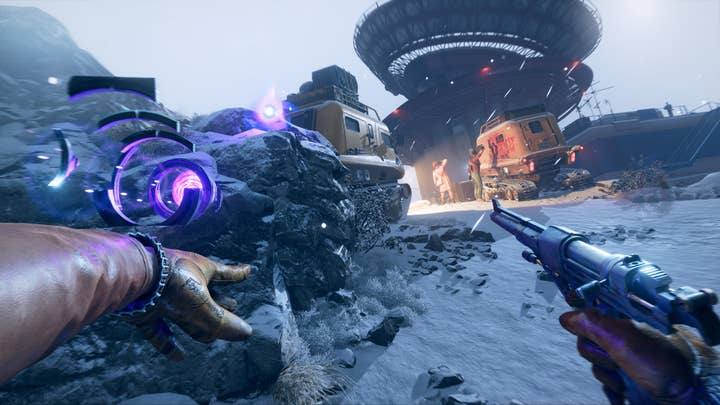
He continues: "It was very stressful for me because this was the first time that I had the responsibility to [direct] a team where I'm not an expert in what they do. Like the engineering team, who'd come and say 'Hey, adding multiplayer to our engine, that will be very tricky, are you sure?' and I had to say, yes, I was sure.
"People look forward to the times where they'll make those decisions. I can tell you, it's terrifying. When it's about your own field, you're very confident. You trust yourself. But when you're talking to artists, to sound designers, programmers, animators and having to make a decision even though they say it'll be hard, that's super scary."
"We strive to make games that are not just liked or appreciated. We strive to make games that are either loved or hated somehow"
Bakaba's confidence grew as his team received more support from above. Bethesda and its playtesters were enthusiastic about the concept of Deathloop, and the fact PlayStation wanted it as an exclusive was a high form of praise.
"That was definitely unexpected but also very validating," Bakaba recalls. "That helped alleviate the doubts that we had internally. Maybe we all as a group couldn't see the potential in where this is going but players see something. Bethesda sees something. There must be something. Maybe it's because we were in the eye of the storm, we couldn't really [see it]."
Even the E3 reveal was a major boost for Bakaba and his team. The Deathloop developers had expected to "go back into the dark, be forgotten" and then show off more of the game closer to release. But the time loop structure, the dual protagonists and the distinct atmosphere glimpsed in the initial footage put Deathloop firmly on the radar for a lot of players.
"Social media was full of 'Arkane can do no wrong,'" Bakaba says. "The pressure was through the roof again."
Arkane Lyon's underestimation of the hype Deathloop generated is perhaps to be expected. While it leans more into the first-person genre than anything the studio has previously produced, this is still an immersive sim: a category that includes acclaimed franchises such as Deus Ex, Thief and Dishonored, all of which are currently on hold.
When we previously spoke to Warren Spector, who has been instrumental in defining this genre, he suggested that this type of game struggles because it "asks people to work." Bakaba agrees, but adds that immersive sims also "ask you to author your experience and own fun."
He observes that there's often a way to "optimise the fun out of the game" -- and this was something the team tried to avoid with Deathloop. Removing the ability to simply quick save and quick load when you're tackling a particular challenge, or removing all the player's weapons and perks at the end of each loop (unless you collect enough Residuum to infuse them), is also designed to encourage players to experiment.
"It's on the player to challenge themselves and try the different tools, take some risks, approach the environment differently," he says. "That was part of the philosophy in Deathloop of having this time loop... you become very familiar with places much earlier than you would in a Dishonored game where you'd have to do a New Game+ to reach that level of mastery. Here you get mastery of the space very quickly.
"Deathloop is a tutorial to play immersive sims right. Although it's only right by my standards because I'm just one guy, but that's one way to look at it."
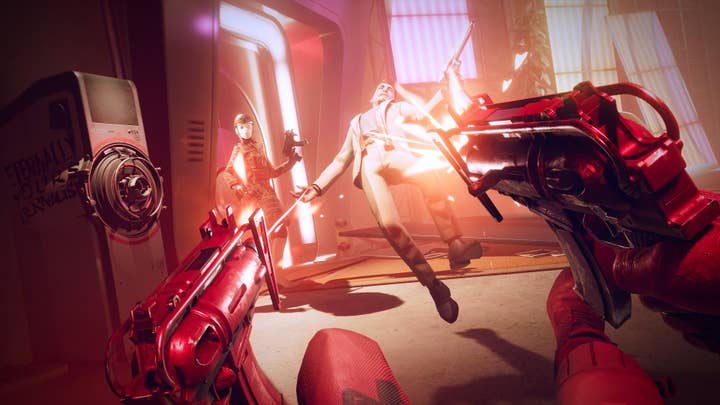
He reflects on how people played Dishonored, with those wanting a 'low chaos' ending leaning towards stealth and 'high chaos' players required to be more aggressive. There was little room to experiment because the game expected a certain behaviour if you wanted to steer the narrative in your desired direction. Deathloop, Bakaba says, is not about what the game expects from you.
"It's something that comes up in every play test: 'What does the game want me to do? I'm not sure.' I've heard that ever since I worked on Dishonored. That's the question that I'd love players to forget. What do you want to do with the game? Because the game probably has an answer for it. It might not be the answer you expect but at least it's a dialogue that starts. I'm seeing this philosophy come into a lot of games."
"People look forward to the times where they'll make the big decisions. I can tell you, it's terrifying"
He adds: "I think it was Warren Spector who said something that clicked with me; at the root, immersive sims are action games and somehow we always end up talking about them in very convoluted ways, very complicated ways, because we are high on our own drugs. We are high on the complexity of those games and somehow want to talk about that to players. Maybe that's not the best way to frontload."
Arkane and Bethesda certainly didn't take that approach with Deathloop, with each reveal and marketing beat focused on the action, the characters, the strangeness of the world, and the story's dual protagonists. The result has been critical acclaim and Arkane's continued reputation as a highly-skilled studio.
Part of this, Bakaba believes, is the decision to focus on the team's strengths. As much as Deathloop is an experiment compared to previous titles, in many ways it's very much in keeping with the studio's successes. Drop an experienced Dishonored player equipped with the Shift and Nexus powers and they'll be simultaneously in uncharted territory and on familiar ground.
For Bakaba, the crucial decision to make when starting a new project is not what is likely to be successful, but what are you likely to do well? Arkane specialises in its genre for a reason; Arx Fatalis may be an RPG, Dark Messiah a medieval shooter, Dishonored a stealth affair, Prey a sci-fi survival experience and Deathloop a shooter, but they are all immersive sims.
"We are always playing with how we can apply that philosophy to different things. But believing in the strengths of the teams is extremely important. We strive to make games that are not just liked or appreciated -- we strive to make games that are either loved or hated somehow. We are pretty glad that we are able to do that in different forms or fashion for 20 years and hopefully 20 more years."
Breaking the crunch loop
Another of Deathloop's accomplishments is that, despite the pressure of anticipation and the complications created by the pandemic, it was developed without crunch. In contrast to Dishonored 2, Bakaba says the team managed to avoid overworking itself -- and hopes this has become the norm for the studio.
"We are proud of Dishonored 2, but it was definitely painful," he says. "Some people left the company after that because they were burnt [out] and we were very sad they left because we loved working with them. It also had a big impact on my personal life, without getting too intimate about it."
He adds: "Deathloop was difficult in different ways, not in the way of 'we just burnt out our entire private life on it.' It was challenging for other things, like the stress, the fact it was novel, the fact we were working from home. But I'm glad that we didn't add to the exhaustion of working whatever crazy number of hours. We managed to do this crazy project without crunch."
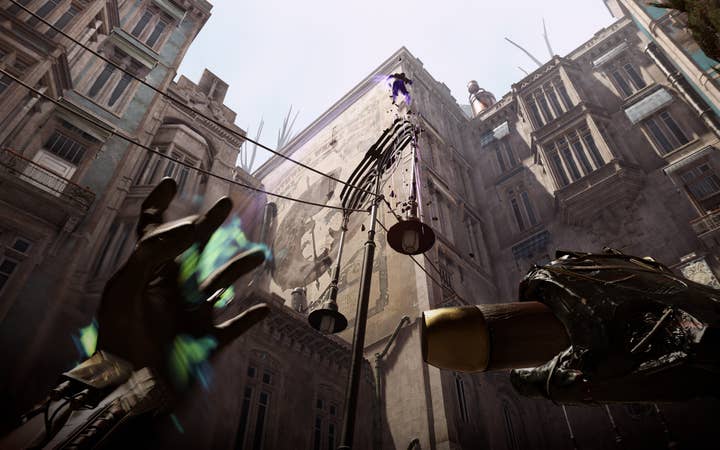
Before he continues, he emphasises that there is a difference between crunch and paid overtime. France's labour laws are very strict on this: overtime cannot exceed a certain number of hours, and must be paid. Of course, the pandemic complicated these matters.
"People were at home, so there was nothing to be able to control in a way how they are working and that became a bit scary," says Bakaba. "We had to be even more stringent on this project. There are some people who'd do extra hours, but no extra hours that were crazy.
"If we did it this time, it means we've evolved our way of thinking and crunch probably is never coming back"
"It's a difficult conversation because it's not as easy as 'This is the right thing to do'. You need to think about the profitability of your studio as well. If you are taking longer to do something, then it's more expensive. If you are paying for extra work, it will be more expensive. It all inflates in cost. It all revolves around cost. Having those conversations with your publisher about how this is the right way to do games now and having those questions be met with agreement, that was very good."
Another factor -- one Bakaba says he's a little shy about -- is that he personally works a lot. Due to his legal status in France, the labour laws apply slightly differently to him, which enables him to work longer hours. However, he adds his experience on these last few projects is making him re-evaluate this.
"I don't know how to do otherwise," he admits. "My father was an actor, my mother was a teacher, I saw them both work very hard. That's the only way I know. But I was inspired by the team and the way we started to rest more. I learnt a lot about pacing myself specifically during this project. I'm one of the people that enjoys working long hours, for a number of reasons, and even me, I can change my thinking. Having those conversations with your team and helping them see what the benefits are is also important.
"It's a complex thing; at the same time, a very dear friend of mine at Arkane actually resigned because we didn't allow him to crunch. It's not that he's masochistic; he's extremely passionate, that's how he wants to invest his time and we're telling him he can't, so he left to work for a company that allowed him to do that. He left for an indie company and because they're indie, they can work however they want. That was an interesting experience; maybe it would have been the same for me if I didn't have this status."
A solution to crunch, he says, is finding a way to keep people stimulated and ensure they feel accomplished without working beyond their standard hours.
"It's a long conversation," he concludes. "You don't clap your fingers and snap your studio culture because if you're not listening to those people, you're also not seeing the problem from both angles. With Deathloop, we were pretty happy with where we landed with no crunch. We didn't spend our entire budget of extra hours, which was cool. We managed to do no mandatory overtime; all overtime was voluntary. We are very proud.
"I don't think we can sustain that forever, but if we did it this time, it means we've evolved our way of thinking and for sure, crunch probably is never coming back."
Dinga Bakaba will be giving the headline keynote alongside key members of the Deathloop team at this year's Develop:Brighton
